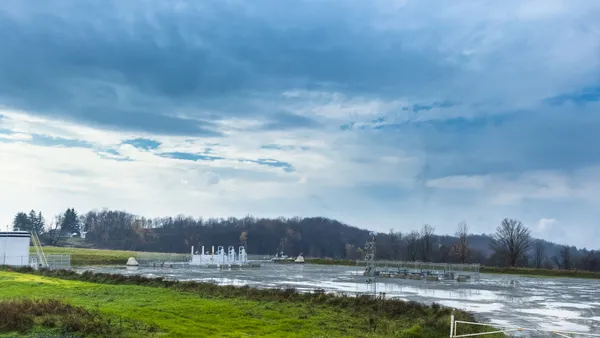Dive Brief:
- Nine states and the District of Columbia have banded together to develop a regional initiative to cap transportation emissions and invest proceeds from the program into cleaner infrastructure that could help incentivize the adoption of electric vehicles (EVs).
- The U.S. utility sector is expecting a rapid increase in EVs on the road — as many as 7 million by 2025 — provided states can help develop the infrastructure necessary to support them. Widespread adoption of zero-emission vehicles is a key strategy in combating climate change, say advocates.
- The Transportation and Climate Initiative (TCI) will be a regional collaboration throughout the Northeast and Mid-Atlantic, similar to the Regional Greenhouse Gas Initiative (RGGI), which addresses pollution from electric generation. The agreement commits participants to design a policy process to implement the caps, after which each jurisdiction will decide whether to adopt and implement the policy.
Dive Insight:
States concerned with pollution and energy issues are increasingly taking a regional approach, with most of the nine TCI states also involved in the regional power emissions trading initiative. That level of coordination could be the only way to make progress, particularly with the federal government is moving in the other direction.
The initiative to address transportation pollution comes as the White House is moving to roll back vehicle fuel efficiency standards and is threatening EV incentives.
"In the absence of an effective national strategy on climate change, states must innovate and lead to protect the health, safety, and livelihoods of our people," Janet Coit, director of the Rhode Island Department of Environmental Management, said in a statement.
The agreement includes a half dozen states currently signed on to RGGI: Connecticut, Delaware, Maryland, Massachusetts, Rhode Island and Vermont. Pennsylvania, New Jersey, Virginia and the District of Columbia are involved with TCI but not RGGI, though each of them has been looking to join the initiative — or re-join, in New Jersey's case.
The Boston Globe reports Maine and New York — each members of RGGI — are also expected to eventually join the transportation pact.
Rob Klee, commissioner of the Connecticut Department of Energy and Environmental Protection, said it is essential to cut emissions from the transportation sector, which accounts for 40% of the state's greenhouse gas emissions.
"Over the next year we will work closely with our regional partners to design a proposal that can be adopted by our states and implemented regionally," Klee said in a statement, The plan will "put us on a path to not only decarbonize our transportation networks, but significantly improve them as well.”
According to the agreement, the policy design process for the cap-and-invest system will include the level at which emissions should be capped, monitoring and reporting guidelines, mechanisms for cost containment and compliance flexibility, and processes and timelines for implementation.















